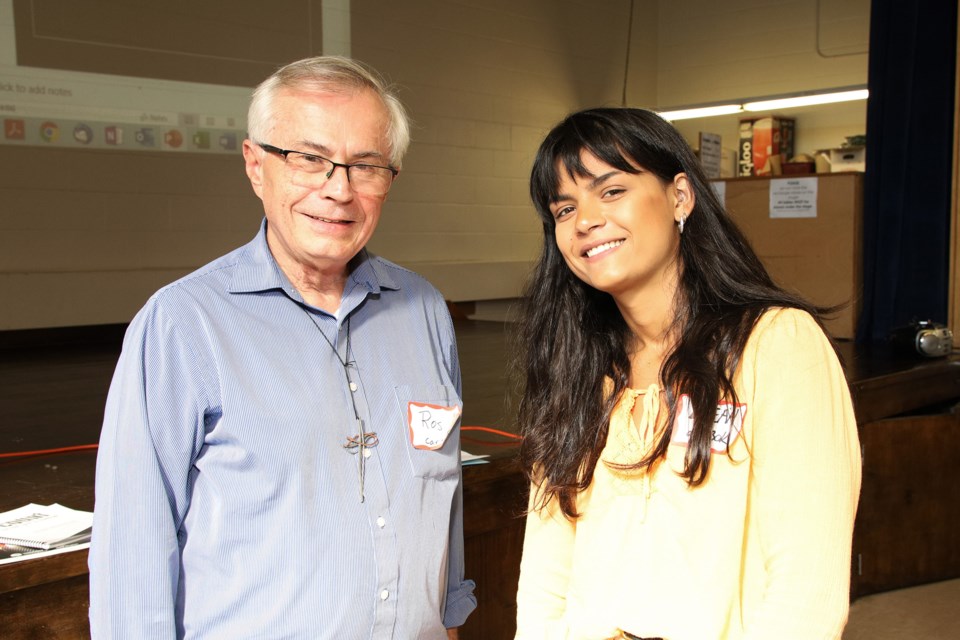Volunteers, professionals who work with the homeless and those at-risk of homelessness, and others in the community on Tuesday packed a meeting hall to capacity for a roundtable in the hope of moving the yardstick on ending homelessness in Newmarket and Aurora.
“I hope this kind of conversation becomes more commonplace than unique,” organizer Rev. Ross Carson said at the two-hour event at Trinity United Church at Park Avenue and Main Street.
The inspiration for the roundtable, in part, was sparked by young photographer Leah Denbok’s portraits of the homeless, some of whom were photographed at Newmarket’s seasonal homeless shelter, Inn from the Cold.
Denbok’s two volumes of striking black-and-white photographs, accompanied by the subject’s personal story, moved the men’s group at Trinity United to take action on what is regarded as a growing local crisis.
The Collingwood photographer told the assembled participants that her work is meant to change the public’s perception of people experiencing homelessness, to humanize the homeless, and shine a spotlight on their stories.
She played a video or her photographs set against a song titled, Who Cares, that has a message “that people don’t choose to be on the street and, in fact, a lot of things in their life brings them to be there”.
But how to most effectively help people on their journey out of homelessness is something about which many who provide services and programs say is constantly evolving.
Inn from the Cold executive director Ann Watson said her organization has found success by partnering with the clients its serves to move them forward. Watson mentioned the shelter’s Getting Ahead in a Just Gettin’-By World program as an example.
The Newmarket shelter will also soon launch a capital campaign to raise the funds it needs for a new location, anticipated to be double in size due to increasing demand.
“That’s one of the biggest problems in the homelessness crisis in Canada is we turn away too often,” Watson said, in reference to Denbok’s portraits, which were on display at the event. “You are drawn into that person’s history and their story and you understand how that happened. We’re forced to look at people in the eye, and there’s something about Leah’s photography that captures the essence of people and we cannot turn away.”
The roundtable participants also heard from representatives of York Region’s homelessness community programs and services, and the United Way Greater Toronto on the ground-breaking research it conducts on the matter, as well as the local funding it provides to agencies.
“We’re finding that people are falling into poverty even more, they’re not digging their way out of poverty,” said Christine Hill, the United Way’s community investments manager.
Organizer Carson drew an emotional response from the crowd with his introduction of Jamie Stevens, a local resident who was homeless for three years and suffered abuse while living on the streets. Carson spoke of others who had lit matches flicked onto their clothing, and of being urinated upon.
“Everybody here has a responsibility to teach everybody in our networks that that kind of behaviour is totally unacceptable, unfair and uncivil, and unsafe to treat another human being in such a way,” Carson said, before Stevens said a few words to attendees. “Jamie has first-hand experience of what it is to live on the streets.”
It was acknowledged that every member of the community has a role to play in eradicating homelessness, and the hundreds of volunteers who prepare and serve food at community meals and offer fellowship to those who are socially isolated were acknowledged and thanked.
At its heart, homelessness has to become unacceptable in the community, Carson said.
During the last half hour of the roundtable, groups discussed among themselves such things as possible building projects that could be undertaken by the faith sector and the York Region government, along with deteriorating funding.
On the subject of building projects, speaker Andrew Gould, a mental health and addictions support specialist who has lived experience with homelessness in York Region, presented an idea that he believes could serve as a model to solve the homelessness crisis.
Gould calls his initiative the Impact Wellness And Recovery (IWAR) program, and it involves providing housing, support, services and programs to the homeless all under one roof.
“I’m looking at taking the abandoned Howard Johnson’s hotel on Yonge Street in Aurora and converting it into a 300-bed shelter,” he said. “This will solve the homeless problem, which is at crisis levels.”
Gould expressed frustration at long-term strategies, lack of funding, inaccurate research and studies on homelessness that, he believes, doesn’t begin to address the reality of what’s happening on local streets.
“This is something that has taken over my life, has become my goal and my destiny,” Gould said. “And part of that destiny is a tailor-made program that handles mental health and addictions crisis, but also tackles the homeless problem.”
Gould said he is presenting his model to regional council next month, has already approached corporations about funding the project, and will seek funding, along with launching local fundraisers in the future.
“This facility would be unique,” he said. “It would offer programming, job skills and training, and I believe this will solve not only the homeless problem in York Region, but the model could be rolled out globally.”
At the municipal level, Gould said local councils could be doing more about “the squalid conditions” some people are forced to live in due to illegal apartments and other units that are deemed affordable. To that, he suggests local governments should move quickly on developing a landlord-certification process.
To learn more about York Region's 2018 homeless study, i Count, visit here.



